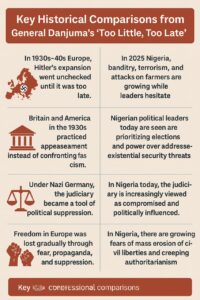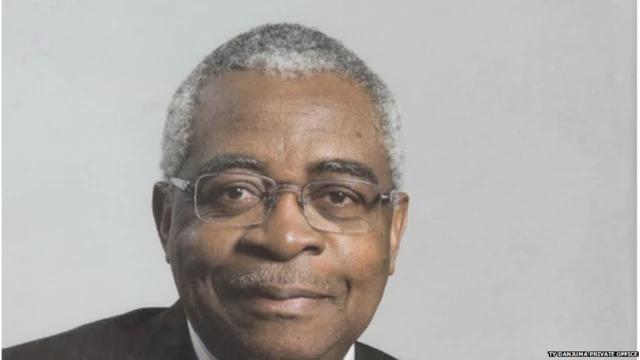“Too Little, Too Late”: General T.Y. Danjuma’s Stark Warning on Nigeria’s Insecurity Crisis
By HeadlineNews.News – April 27, 2025
In a rare and deeply philosophical intervention, General Theophilus Yakubu Danjuma (rtd) — elder statesman, former Defence Minister, and one of Nigeria’s most respected military veterans — has issued a powerful critique of Nigeria’s worsening insecurity, likening the nation’s current trajectory to the slow but catastrophic collapse of Europe in the 1930s under the onslaught of fascism.
Titled “Too Little, Too Late”, Danjuma’s speech draws direct historical parallels between the appeasement of tyranny before World War II and Nigeria’s apparent paralysis in the face of growing banditry, terrorism, and systemic breakdown today.

Summary of General Danjuma’s Argument:
Failure of Courage and Leadership:
Like Britain and America’s initial inaction against Hitler, Nigeria’s political, military, and judicial elite are accused of lacking the courage, foresight, and will to confront rising fascistic and jihadist threats within the country.
Spread of Insecurity:
Danjuma highlights how banditry and terrorism, once confined to forests and rural areas, have now invaded highways, farms, and are slowly encroaching urban centers.
Systemic Collapse:
Drawing from the judicial handling of self-defense cases, alleged bias in court judgments, and political interference in democratic institutions, he portrays a country where all arms of government have been captured by vested interests.
Moral Decay of Society:
The former general criticizes a passive and self-indulgent citizenry, fractured political opposition, compromised religious bodies, and demoralized civil organizations — all failing to resist what he describes as a silent, creeping fascism.

Historic Echo:
Danjuma warns that just as Nazi Germany was allowed to grow unchecked due to appeasement and indifference, so too are modern-day extremist forces in Nigeria gaining ground under the noses of a divided and timid populace.
“Indecision is a decision. Refusing to fight and confront the enemy is itself a decision to submit to his tyranny,” he declared, quoting lessons from history.

Key Historical Comparisons Cited:

Analysis: How Accurate Are Danjuma’s Warnings?
Insecurity Reality:
Verified figures from NBS and Global Terrorism Index corroborate that kidnapping, banditry, and terrorism remain top security threats in Nigeria, with tens of thousands displaced annually.
Judicial and Political Erosion:
Reports of controversial judgments, political strong-arming of state institutions, and undermining of democratic processes (e.g., in Rivers State and the Supreme Court controversies) lend credence to Danjuma’s concerns.
Civic Weakness:
Civil society groups that once championed democracy appear fragmented or heavily politicized today, echoing Danjuma’s lament.
Economic & Social Breakdown:
As food security deteriorates due to attacks on farmers, and inflation surges, Nigeria faces clear warning signs reminiscent of pre-crisis environments in failed states.

Expert Commentary:
Dr. Amiida Fraser, MFR, governance consultant, observes:
“General Danjuma’s speech is a clarion call, not a cry of despair. History teaches that threats to liberty often grow quietly until they can no longer be checked. Nigeria must heed these warnings — strengthen institutions, empower civil society, and resist creeping authoritarianism — before it is too late.”
Political historian Prof. Femi Olawale adds:
“The speech reflects deep frustration. Danjuma is urging Nigerians not to repeat the tragic cycles of history. His critique deserves serious reflection across all classes.”

Conclusion: A Wake-Up Call or a Missed Opportunity?
General T.Y. Danjuma’s “Too Little, Too Late” is one of the most sobering reflections on Nigeria’s national trajectory in recent memory.
Whether it galvanizes the much-needed courage and leadership he calls for — or becomes, as he fears, a document for historians of a failed republic — will depend on the action or inaction of Nigeria’s political leaders, civil society, and its people in the critical months ahead.
The choice, as history shows, is between confronting tyranny early — or paying dearly later.
Dr. G. A. Fraser. MFR
The National Patriots.




